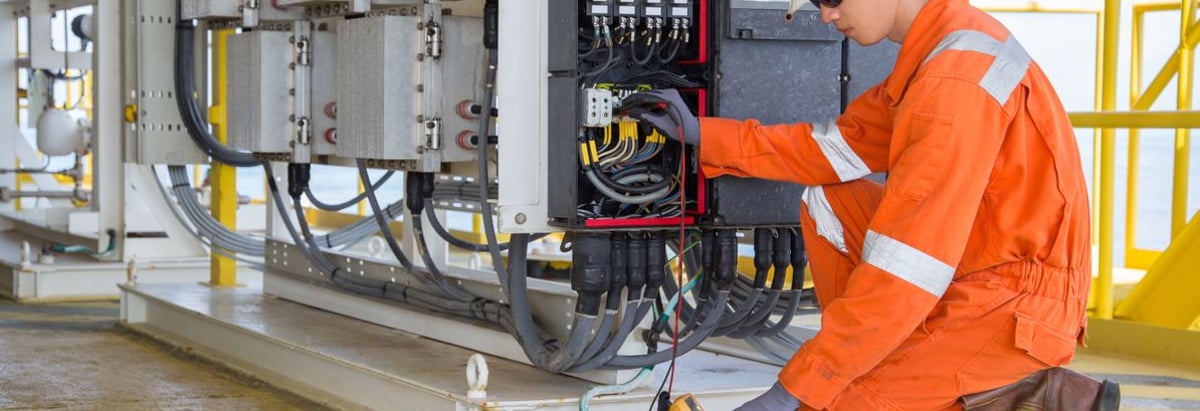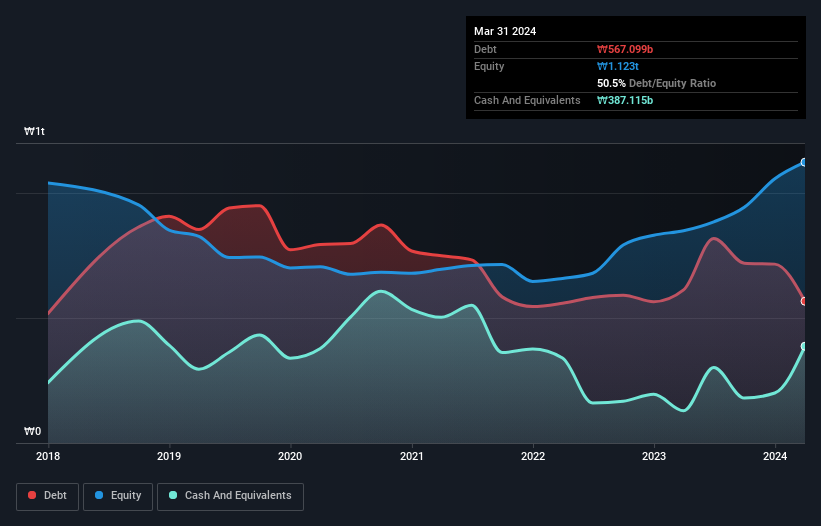- South Korea
- /
- Electrical
- /
- KOSE:A267260
Here's Why HD Hyundai Electric (KRX:267260) Can Manage Its Debt Responsibly

Howard Marks put it nicely when he said that, rather than worrying about share price volatility, 'The possibility of permanent loss is the risk I worry about... and every practical investor I know worries about.' So it might be obvious that you need to consider debt, when you think about how risky any given stock is, because too much debt can sink a company. We note that HD Hyundai Electric Co., Ltd. (KRX:267260) does have debt on its balance sheet. But the real question is whether this debt is making the company risky.
What Risk Does Debt Bring?
Generally speaking, debt only becomes a real problem when a company can't easily pay it off, either by raising capital or with its own cash flow. Part and parcel of capitalism is the process of 'creative destruction' where failed businesses are mercilessly liquidated by their bankers. However, a more usual (but still expensive) situation is where a company must dilute shareholders at a cheap share price simply to get debt under control. Having said that, the most common situation is where a company manages its debt reasonably well - and to its own advantage. When we examine debt levels, we first consider both cash and debt levels, together.
Check out our latest analysis for HD Hyundai Electric
How Much Debt Does HD Hyundai Electric Carry?
The image below, which you can click on for greater detail, shows that HD Hyundai Electric had debt of ₩567.1b at the end of March 2024, a reduction from ₩612.3b over a year. However, it does have ₩387.1b in cash offsetting this, leading to net debt of about ₩180.0b.

How Healthy Is HD Hyundai Electric's Balance Sheet?
The latest balance sheet data shows that HD Hyundai Electric had liabilities of ₩1.68t due within a year, and liabilities of ₩325.3b falling due after that. On the other hand, it had cash of ₩387.1b and ₩757.5b worth of receivables due within a year. So its liabilities outweigh the sum of its cash and (near-term) receivables by ₩856.9b.
Since publicly traded HD Hyundai Electric shares are worth a total of ₩12t, it seems unlikely that this level of liabilities would be a major threat. However, we do think it is worth keeping an eye on its balance sheet strength, as it may change over time. But either way, HD Hyundai Electric has virtually no net debt, so it's fair to say it does not have a heavy debt load!
We measure a company's debt load relative to its earnings power by looking at its net debt divided by its earnings before interest, tax, depreciation, and amortization (EBITDA) and by calculating how easily its earnings before interest and tax (EBIT) cover its interest expense (interest cover). This way, we consider both the absolute quantum of the debt, as well as the interest rates paid on it.
HD Hyundai Electric's net debt is only 0.40 times its EBITDA. And its EBIT covers its interest expense a whopping 11.5 times over. So you could argue it is no more threatened by its debt than an elephant is by a mouse. Better yet, HD Hyundai Electric grew its EBIT by 141% last year, which is an impressive improvement. That boost will make it even easier to pay down debt going forward. When analysing debt levels, the balance sheet is the obvious place to start. But it is future earnings, more than anything, that will determine HD Hyundai Electric's ability to maintain a healthy balance sheet going forward. So if you want to see what the professionals think, you might find this free report on analyst profit forecasts to be interesting.
Finally, a company can only pay off debt with cold hard cash, not accounting profits. So we clearly need to look at whether that EBIT is leading to corresponding free cash flow. In the last three years, HD Hyundai Electric's free cash flow amounted to 25% of its EBIT, less than we'd expect. That's not great, when it comes to paying down debt.
Our View
Happily, HD Hyundai Electric's impressive EBIT growth rate implies it has the upper hand on its debt. But truth be told we feel its conversion of EBIT to free cash flow does undermine this impression a bit. Looking at the bigger picture, we think HD Hyundai Electric's use of debt seems quite reasonable and we're not concerned about it. While debt does bring risk, when used wisely it can also bring a higher return on equity. When analysing debt levels, the balance sheet is the obvious place to start. However, not all investment risk resides within the balance sheet - far from it. For instance, we've identified 1 warning sign for HD Hyundai Electric that you should be aware of.
If you're interested in investing in businesses that can grow profits without the burden of debt, then check out this free list of growing businesses that have net cash on the balance sheet.
Valuation is complex, but we're here to simplify it.
Discover if HD Hyundai Electric might be undervalued or overvalued with our detailed analysis, featuring fair value estimates, potential risks, dividends, insider trades, and its financial condition.
Access Free AnalysisHave feedback on this article? Concerned about the content? Get in touch with us directly. Alternatively, email editorial-team (at) simplywallst.com.
This article by Simply Wall St is general in nature. We provide commentary based on historical data and analyst forecasts only using an unbiased methodology and our articles are not intended to be financial advice. It does not constitute a recommendation to buy or sell any stock, and does not take account of your objectives, or your financial situation. We aim to bring you long-term focused analysis driven by fundamental data. Note that our analysis may not factor in the latest price-sensitive company announcements or qualitative material. Simply Wall St has no position in any stocks mentioned.
Have feedback on this article? Concerned about the content? Get in touch with us directly. Alternatively, email editorial-team@simplywallst.com
About KOSE:A267260
HD Hyundai Electric
Manufactures and sells electrical equipment in South Korea.
Outstanding track record with flawless balance sheet.

